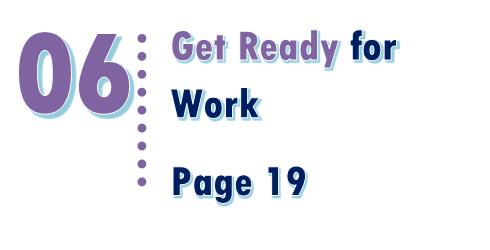
 | |
 |  |
 |  |
 |
|
Updated as of Mar 2024
Congratulations on attaining your Certificate/Diploma/Bachelor degree in Early Childhood Care & Education and welcome to an exciting and fulfilling journey as an Early Childhood Professional!
Early Childhood Educators play an integral role in shaping the lives of children throughout their early formative years. They create a myriad of meaningful learning experiences and opportunities which support children in their physical, cognitive,
language and social-emotional development.
As you embark on this remarkable journey to create a good start for every child, we want you to start well! We want to walk alongside you and support your career development through the provision of continuous learning opportunities.
This induction booklet provides information to help you better assimilate into your new working environment. Designed to complement your employer’s induction programme and other relevant policies and procedures, we have included a brief overview
of the Early Childhood sector to facilitate your understanding of an Early Childhood Educator’s role in the broader Early Childhood structure.
We wish you a satisfying and successful professional career in the Early Childhood sector!
How Shi Min (Ms)
Director, Partnership and Programmes
Early Childhood Development Agency
Set up in 2013, the Early Childhood Development Agency (ECDA) serves as the regulatory and developmental agency for the Early Childhood sector in Singapore, overseeing key aspects of children’s development below the age of seven across both kindergartens
and child care centres. To achieve the vision of giving every child a good start, ECDA works in partnership with stakeholders such as preschool operators, Early Childhood educators, families and the community to ensure every child has access to affordable
and quality Early Childhood development services and programmes.
ECDA’s key responsibilities are to:
- Oversee measures to raise quality standards of early childhood programmes, including regulation, quality assurance, and the provision of early childhood development resources;
- Facilitate the training and continuing professional development of early childhood professionals;
- Master-plan for infrastructure and manpower resources to support the early childhood sector;
- Provide subsidies and grants to keep quality pre-school programmes affordable, especially for low and middle income families;
- Conduct public education and outreach to raise parents’ awareness and support for their children’s development; and
- Uplift the image and professionalism of the early childhood sector through strategic partnerships and programmes.
More information on ECDA can be found at www.ecda.gov.sg

The Early Childhood sector comprises childcare centres and kindergartens, providing preschool programmes for children under the age of seven. These programmes are provided by a range of operators, which include MOE Kindergartens, Anchor Operators, Partner Operators, social service agencies, and commercial operators.

Source: Skills Framework for Early Childhood Guidebook.

Today, children under the age of seven with developmental needs can receive support through a range of Early Intervention (EI) programmes depending on their needs. The DS-LS, DS-Plus and EIPIC programmes are funded by the Government today. Families may
also tap on other privately-provided EI services to support their children’s developmental needs
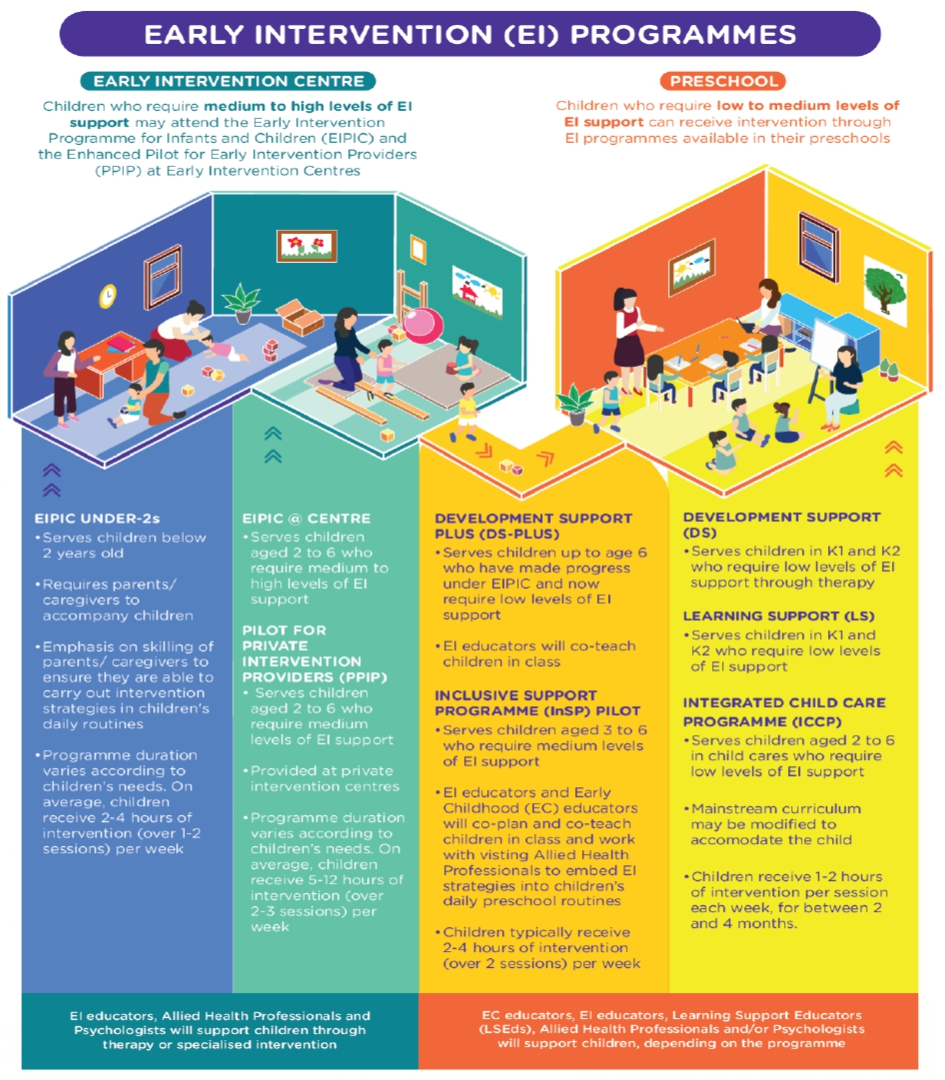
Source: Skills Framework for Early Childhood Guidebook.
This chart shows the basic Early Childhood qualifications required to start a career in Early Childhood and general progression pathways.
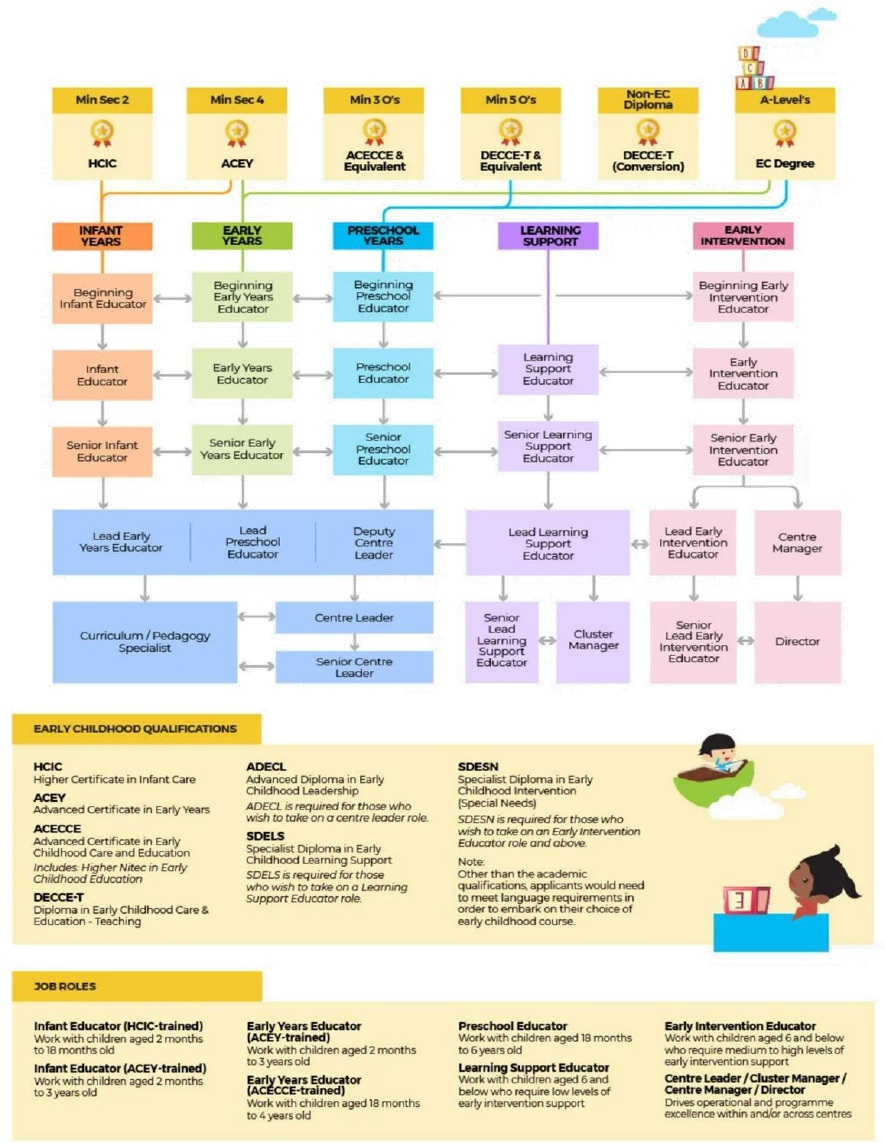

Source: Shape our Tomorrow website.
As a professional, you are an advocate of lifelong learning. It is essential to learn new skills and knowledge throughout your career and to constantly keep up-to-date with issues and developments in the field.
This may take different forms including independent study, professional reading, participating in projects, sharing sessions and learning journeys. Below is an overview of the suite of initiatives to support you at every stage of your career.
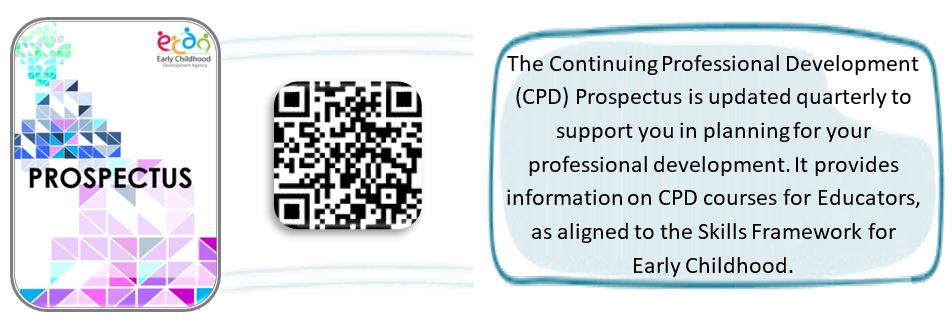

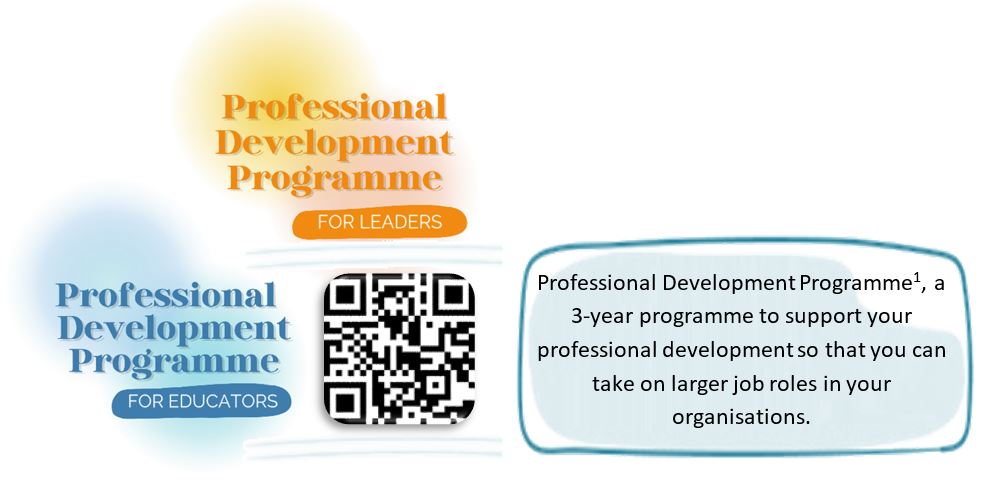

1Nominee is to be employed under a Non- Anchor Operator Early Childhood Development Centre (ECDC) registered or licensed with ECDA. More information can be found at Professional Development Programme website.

Transitioning into a new job is not easy, and these challenges can feel amplified especially for a fresh graduate with little to no work experience. Here are some tips by Kindergarten Teacher, Oon Siu Suan, who was awarded the ECDA Scholarship in 2019, to help you transit well as a new teacher:
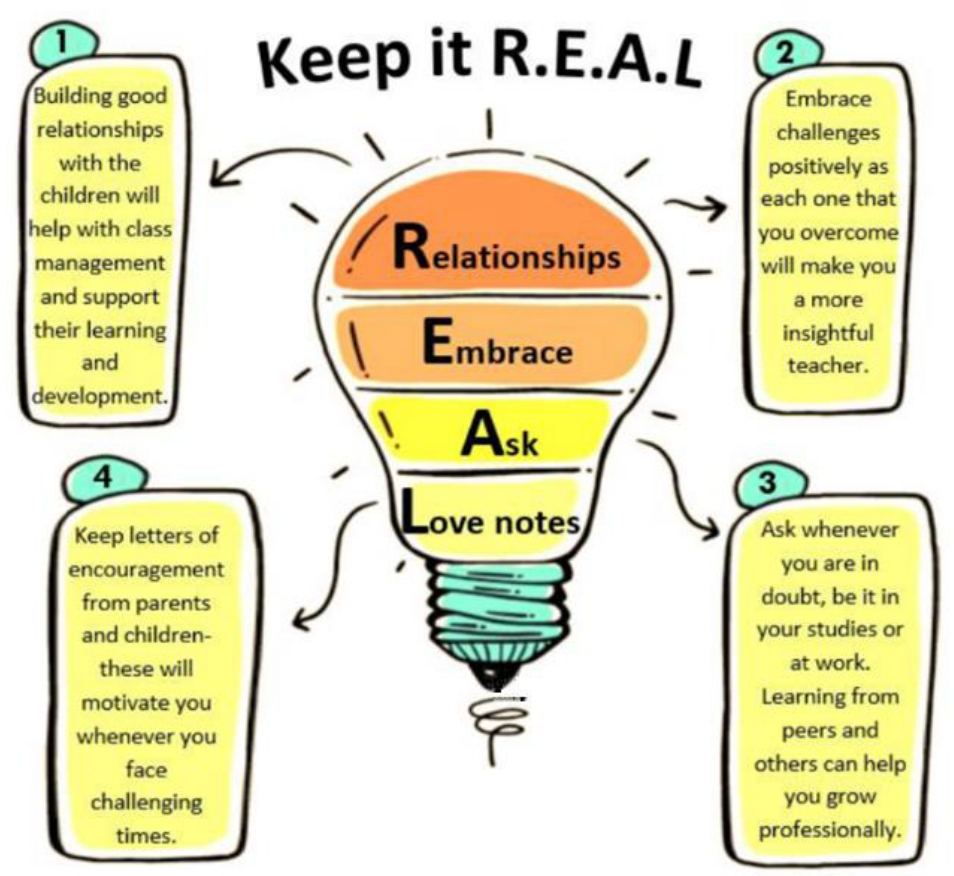
Source: Jan-Mar 2020 issue of Beanstalk

- Treating Others with
 espect and
espect and  ignity
ignityA culture of respect and dignity in the workplace ensures a healthy working environment. Contribute to this environment by:
- Building a sense of community spirit at work through group lunches, organising and participating in events or workshops that emphasise team building.
- Abiding by work ethics and maintaining confidentiality.
- Treating your colleagues as you would like them to treat you.
- Supporting your colleagues in times of need.
- Managing Emotions
It is common to experience anger and anxiety at work. When you are overwhelmed with such emotions, there may be a tendency to react explosively or become withdrawn. Learn to manage your emotions well so a sense of calm and stability can be maintained. This allows you to work better with your colleagues, even in stressful work situations.
Here are some techniques you can try to manage your emotions better.
a. Checking Your Thought PatternsOne of the ways to manage your emotions is to check and be more aware of your thought patterns. At times, negative thoughts can make us feel that we are not in control of our emotions. By learning how to identify these negative thoughts and correct them accordingly, we can react more appropriately to the situation.
b. Practise Relaxation Techniques
When things get out of hand, try slowing things down and trying these relaxation techniques to regain your calm.
- Deep breathing (inhaling and exhaling slowly until you feel calm)
- Playing relaxing or soothing music
- Excusing yourself from the situation to take a breather. However, assure the other party that you will come back to handle the situation when you have calmed down.
- Effective Communication

Effective communication in the workplace will minimise misunderstandings among colleagues and maximises work efficiency. When there are communication breakdowns at work, we spend time and energy trying to make amends.
a. General Communication Tips
It pays to be mindful of these four factors when communicating with others.- Choice of words
- Tone of voice
- Non-verbal cues: Body language and expressed emotions
- Relationships between communicating parties
b. Communicate Effectively with Your Peers
It is important to be an active listener and speak with discretion when communicating with your colleagues/peers. It gives people the impression that you are genuinely interested in their views and shows respect to the speaker.
Speaking with discretion also helps to avoid unnecessary misunderstandings. Cultivate the habit to think before you speak so that you are more likely to say the right thing at the right time.
Workplace relationships can be improved if you communicate clearly and frequently with your colleagues on the following:- What you are currently doing for the company.
- What are some goals you are striving for at work, and perhaps even some of your personal ones that may affect work.
- Some of the difficulties you are facing with customers, management, colleagues (be careful to put it across tactfully and sound like you would like to address the difficulty!).
c. Communicate Effectively with Your Superiors
Learn to accept instructions and feedback from your superiors as it is important to understand their positions and reasoning. You should also not hesitate to ask for help when you need it and to explain problems that you encounter in your work when necessary.
d. The Language of Email

Emails are great if you have a specific request or updates for a colleague as the message can be read at their convenience. Try sounding more cordial instead of being distant by typing niceties like “Have a great day!” to make your emails sound more positive and pleasant for the reader.
Consider your choice of words carefully when crafting your email messages. Avoid writing impulse emails in the heat of the moment if you’re unhappy or angry! Pause a moment, cool down and review what you have written so it sounds more objective. Remember, stick to the facts and avoid character attacks! Being objective, constructive and offering solutions to improve the situation go a long way into cultivating better workplace relationships.
As you learn to communicate more effectively at work, you will be able to achieve your goals, garner support and feel much happier at work. Increasing understanding with the people you work with will lead to a happier and less stressful working environment. - Recognising Your Role in the Team

Working as a team means that you are part of a collective body whereby everyone is working towards a common objective or goal. This also means that you need patience and understanding to learn and adapt to different working habits, points of view, and personalities of your team members.
a. Acknowledge Contributions
The affirmation and validation that you give to your members demonstrate appreciation for who they are and what they are doing. A simple gesture like saying a word of thanks or well done is not only good manners but helps to brighten up someone’s day at work.
b. Offer Emotional Support
Offering support to your colleagues in times of adversity enables you to be more involved in their life. This can range from encouragement to offering a listening ear when needed. Although we should still remain professional, being there for one another helps bring the team closer together as a unit.
c. Go the Extra Mile
In a workplace environment, doing something special for your colleagues or peers may not require a lot of effort. It could be something small like running an errand, answering the phone or even pulling out a file from the library for your colleague. Simple actions will help your colleagues see you positively and appreciate who you are.
Source: This article is extracted from the Health Promotion Board.

Stressful situations, whether at school or at work, can sometime make us experience stress symptoms. Ms Vivienne Ng, Chief Psychologist from Ministry of Social and Family Development shares her tips on self-care and building resilience.
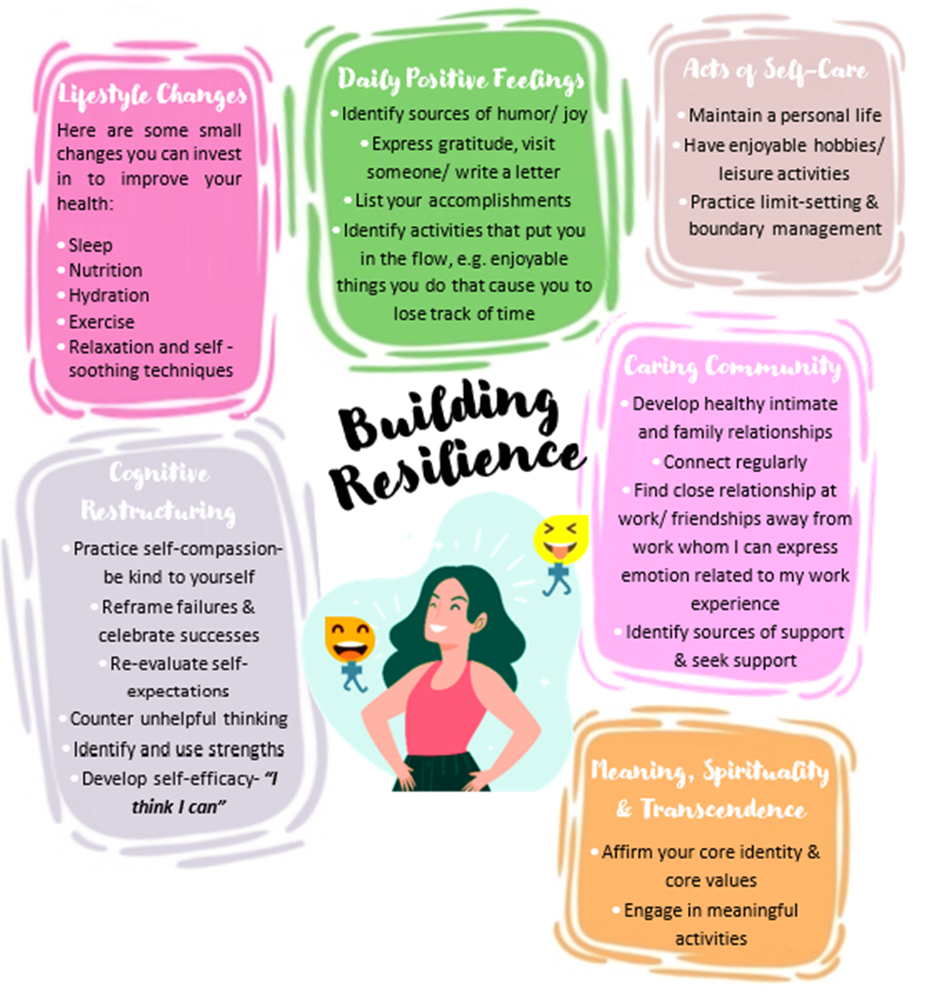
Source: ‘Time-out for Teachers’ Read the guide in ONE@ECDA - Resources.

Work stress is often unavoidable. We stress ourselves out over deadlines and demanding customers. Here’s how to relieve stress and attain mental wellness at work.
Tips on How to Relax and Destress
Stress at work — be it rushing a deadline for a report or dealing with demanding clients — is often unavoidable. While some level of pressure is good to keep you motivated at work,
excessive stress can be overwhelming and harmful to your physical and emotional well-being. Learn how to relieve stress with these quick fixes at the office.
- Take a Power Nap to Reduce Stress

It sounds counterintuitive — especially when there’s plenty of work waiting for you — but a short 15 to 20-minute power nap can help you “reset” your frazzled system. You’ll feel more energised and alert to tackle the next task when you wake up from your short nap.
Research also shows that taking naps promote alertness on the job, reduces sleepiness and improves cognition performance. This could help you to solve problems faster, or get over that mental block, hence clearing the backlog of work more efficiently. Also, remember to get enough sleep (7-9 hours daily for an adult) to have better concentration and focus throughout the day.
- Stretch Out Your Work Stress
We’ve all experienced it before — when we’re stressed, our bodies tense up. Hunching over your desk won’t do your back, shoulders, and neck muscles any favours. A quick way to get relief from stress and anxiety is to get up and stretch those tensed muscles.
You could also try chair yoga, a gentle form of yoga that can be easily done in the office. Start with the seated chest lift — this move opens your chest and stretches your back. Sit at the edge of your chair with your feet flat on the ground, and your hands rested behind you at the back of the seat, fingers pointing away. Inhale, lift your chest and then exhale before releasing your hands. Repeat this move five times.
- Relax Your Senses by Seeing Green

Human beings have a natural affinity for elements of nature, which has the innate ability to heal our body and mind, as well as improve our mood and help us feel more relaxed. Japanese’s Shinrin-yoku (which means “forest bathing”), is the idea of being in wild and natural places. Taking strolls in Zen gardens are ways to improve our overall well-being. They evoke a sense of serenity and inner peace that heals the mind, body and soul and allows one to set aside some time for self-reflection.
Don’t worry if there isn’t a Zen garden or park nearby. You can still relax by helping to tend to the office plants, or even better, build your own terrarium. Observing the plants growing day-by-day can be highly therapeutic; open terrariums or office plants can even help to eliminate odours and absorb pollutants in the air.
Relax your mind and find inner peace with a miniature Zen garden set that you could either make or buy. The repetitive act of combing the sand and arranging the stones has a calming effect and provides stress relief. It also trains the mind to focus on the present, freeing it from stray thoughts and worries. - Relieve Work Stress with Calming Music or Nature Sounds
Are there times when you need to focus but are distracted in the office? Find some inner peace by listening to calming music and sounds of nature. The sounds of crashing waves, trickling raindrops and other sounds of nature are amongst the most soothing and pleasurable states. They can help the brain to relax, focus better and boost your efficiency at work.
Research has shown that employees who connect more with nature at work reported fewer stress-related complaints. Listening to nature sounds can help one recover from mental stress more quickly, minimise the negative effects of mental health issues like depression and improve your mood to be more positive. Check out YouTube as there are many sounds of nature videos that you can listen to. Here’s a video to last you for the next four hours. - Think Positive to Better Manage Work Stress
Changing your mindset and having a positive attitude can make you happier. Learn to be more optimistic of the situations around you and you will realise that you are able to manage stress better.
- Revive Your Mind with Creative Breaks

Before you dive your head into rushing the last-minute presentation and stressing yourself out, grab some colour pencils for some creative doodling. The concentration of the mind and the positive emotions evoked through the spontaneous act of drawing keep your mind focused on the present moment which declutters your thoughts, improves overall mental wellness and makes one happy.
Doodling is certainly not a mindless activity as it actively engages your brain and hones the processes that help us to multi-task, focus and plan. You can also try your hands at origami and turn the colourful paper into creative animals and objects. Both are great ways to recharge your mind and de-stress.
- Practice Mindfulness for Better Mental Wellbeing
Take a few minutes to practise mindful breathing exercise every day. It will help your mind and body to relax. Mindfulness is the practice of focusing your attention on the present moment. Studies show that mindfulness helps to increase tolerance of negative emotions and works as a promising intervention for treating anxiety and mood problems.
Make the effort to take short breaks during work and incorporate some simple mindfulness techniques like taking deep breaths with your eyes closed. A short mindfulness exercise every day works wonders to help you re-focus and clear your mind. Here’s 6 mindful exercises you can try today. - Talk It Out with A Co-Worker or Friend
If you’re stressed out at work or feeling upset with an annoying colleague, don’t let the problem worsen by bottling it up. Rant to a friend or co-worker about it, and you’ll feel instantly better.
Sharing your troubles with your co-worker or friend can help you relieve stress and anxiety. You’ll also hear different perspectives on how to tackle these issues. By confiding your issues with the people you trust, you can also draw renewed strength from them, learn from their experiences and feel more energised to manage the work stress. - Manage Your Time

Plan your time well so that you can complete tasks on time. Break large tasks into smaller, manageable parts to prevent feeling overwhelmed. This will also help you avoid stress and procrastination as work will seem more manageable and less intimidating.
Source: This article is extracted from the Health Promotion Board.

When you start a new job, it is normal to feel some level of uncertainty. This checklist serves as guide to help you better assimilate into the new working environment. Your centre may have different induction programmes for new staff.

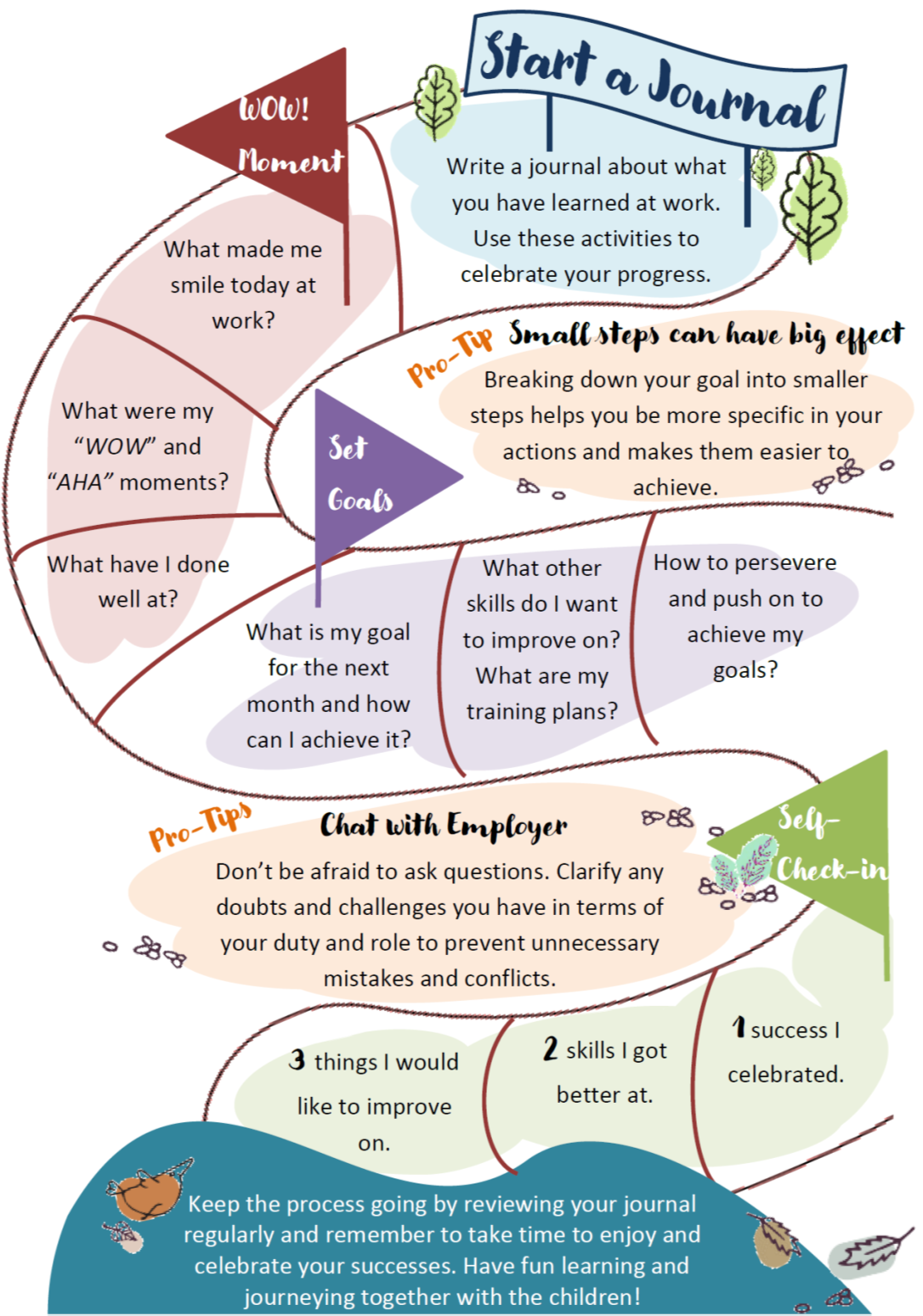

Connect with us at ECDA_PP@ecda.gov.sg and follow us on:
 |  |  |


Ask ECDA

